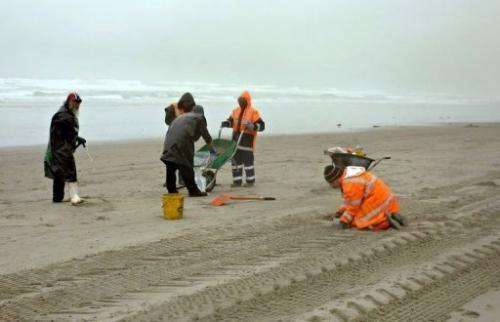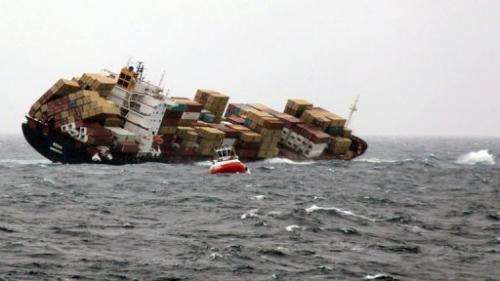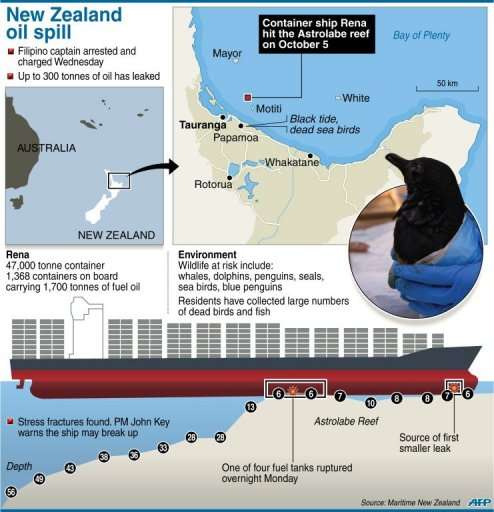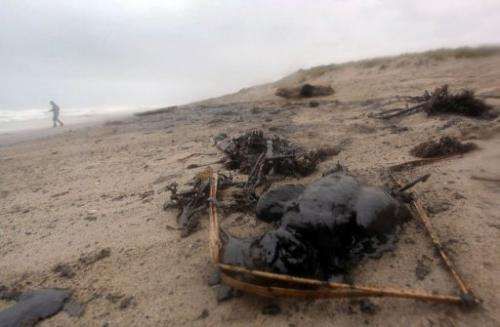Oil-slick ship at risk of breaking up: NZealand PM

Fears grew Wednesday that a ship stuck on a New Zealand reef may break up and release a new tide of oil, as its captain was charged over the nation's worst maritime pollution disaster.
Prime Minister John Key said that cracks had been found in the hull of the stricken container ship Rena, and that the situation was precarious, with the boat listing at a steep angle in stormy seas.
"We have identified stress fractures on the ship. We can't rule out the risk of the ship breaking up, that's certainly being monitored," he told reporters in Tauranga where already beaches have been fouled and wildlife found dead.
"I wish that boat wasn't spewing oil out into New Zealand's pristine sea, but it is and we're dealing with that."
Up to 300 tonnes of heavy fuel has leaked into the environmentally sensitive Bay of Plenty since the Liberian-flagged Rena hit the Astrolabe Reef, 22 kilometres (15 miles) off the North Island coast, last Wednesday.
Officials have warned that New Zealand faces an even worse disaster if the Rena breaks up on the reef and releases all 1,700 tonnes of oil on board.
The ship's captain, whose name was suppressed after earlier being identified in the media, appeared in a Tauranga court amid a heavy police presence, to be charged with operating a vessel in a manner causing unnecessary danger or risk.

He was bailed to reappear on October 19 on the charge which carries a maximum penalty of NZ$10,000 ($7,800) or one year in jail.
The second officer of the Rena was also charged with operating a vessel in a manner causing unnecessary danger or risk, Maritime New Zealand said.
He was in charge of navigational watch on the Rena when it hit the reef.
Overnight, containers began plunging off the stricken vessel in heavy seas. Maritime New Zealand (MNZ) said none of them contained hazardous material, but TVNZ reported seeing bright blue smoke emitting from one of them.
It was highly likely more containers will topple off because of the severe weather conditions and the vessel’s heavy list, MNZ said.

"There are 1,368 containers on board. Eleven containers containing hazardous substances are still on the vessel and are not among the 70 estimated overboard," it said, adding that shipping was re-routed to avoid the hazard.
An aerial survey, likely to go ahead later in the day when the weather improves, would give a clearer indication of exactly how many containers had crashed into the sea, the maritime body said.
Radio New Zealand reported that a floating crane was en route from Singapore to transfer the rest of the containers off the badly slanting ship.
On Tuesday, the Rena issued a mayday and nearby boats, including six navy vessels, scrambled to evacuate a salvage crew when the troubled vessel shifted position on the reef as it was pounded by huge waves.
Compared to some of the world's worst oil spills, the disaster remains small -- the Exxon Valdez which ran aground in 1989 in Alaska dumped 37,000 tonnes of oil into Prince William Sound.

But it is significant because of the pristine nature of New Zealand's Bay of Plenty, which teems with wildlife including whales, dolphins, penguins, seals and rare sea birds.
Lumps of toxic sludge began making landfall Tuesday, and local residents awoke Wednesday to a black tide as thick waves, topped with a dark foamy scum, washed dead birds and fish onto the shore.
"I can smell it from my house," local artist Peter Cramond, who lives 400 metres (1,300 feet) from the beach, said as he leaned on his walking stick in howling winds and driving rain.
"I haven't slept all night knowing what's happening here to all the bird and sea life. It's horrible."
Local residents said they had collected large numbers of dead birds and fish on beaches, while a wildlife rescue centre said it expected to reach its capacity of 500 oiled birds in coming days.
(c) 2011 AFP





















